How Often Should I Take My Dog To The Vet?


Ensuring the health and well-being of our furbaby is a top priority for all pet parents. But does that mean we should take them to the vet every other day? Since that is not possible, you probably want to know ‘How Often Should I Take My Dog To The Vet?’ The answer can vary based on factors such as your dog’s age, breed, and overall health.
In this article, we will explore the recommended frequency of vet visits for dogs at different life stages. We will also talk about the importance of preventive care and tips for making the most out of each veterinary appointment. So read on.
How Often Should I Take My Adult Dog To The Vet?

If your dog is quite healthy and fit, then an annual checkup is quite enough. Since we already know that dogs age faster than humans, these annual visits to the vet are quite important and, at the same time, necessary.
These yearly visits at the vet’s clinic will consist of complete physical examinations, including a dental check. The vet will also check if your dog’s vaccinations are up to date or not and complete them.
If your dog has contracted any infection or disease, then the visits to the vet may increase as per your vet’s recommendation. It will depend on the infection and disease that they have contracted.
How Often Should I Take My Puppy To The Vet?
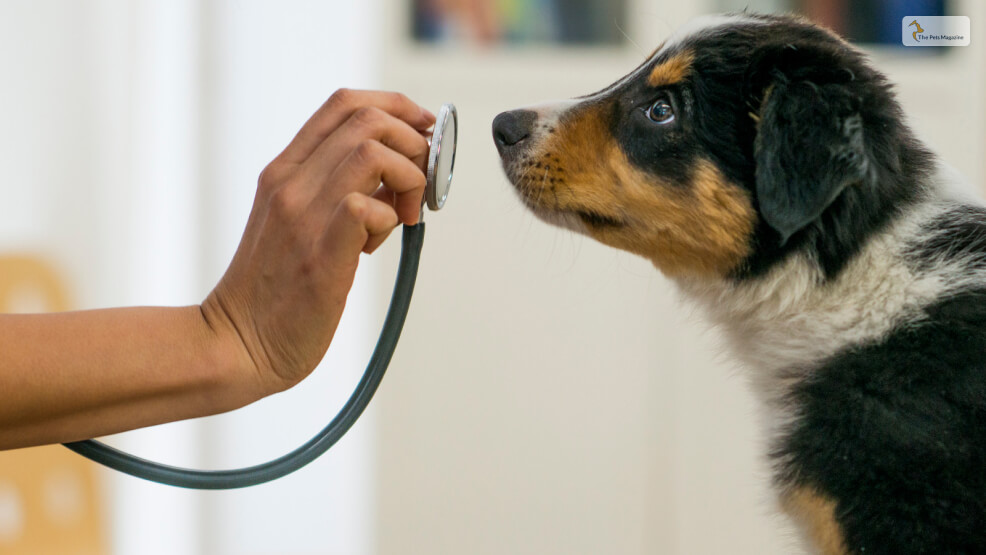
When you have a pet puppy, there are some specific ages or life stages wherein you should take your puppy to the vet. These stages are explained below.
Two To Three Weeks Old
Around this time, the first vet checkup of your puppy is done, and the vet is going to check for certain things like:
- Has the puppy been given a dewormer medication?
- Puppy’s overall health checkup is completed or not
Six To Eight Weeks Old
When your puppy is about six to eight weeks old, the puppy is checked for the following things:
- Microchip
- Tick and flea prevention treatment
- The first vaccination is given or not
- Whether the Heartworm medication has been administered or not
Up To Six Months Old
When your puppy is about 12 to 16 weeks old, it might need a few more vaccinations, so you have to make an appointment with the vet.
Your vet might ask you to bring your puppy back for additional appointments for a wellness checkup. However, these can be done between vaccinations as well.
How Often Should I Take My Senior Dog To The Vet?
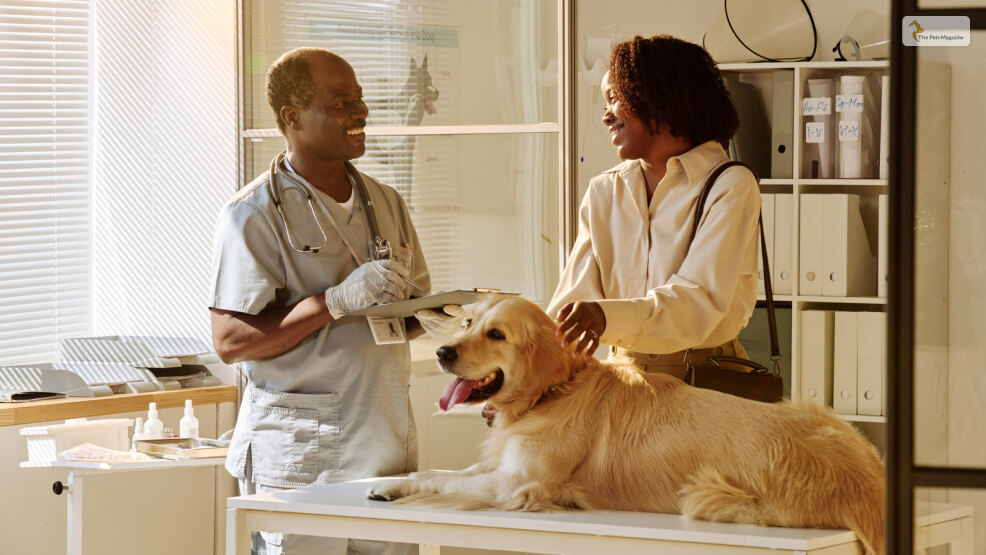
Just like you need to do a thorough checkup of your puppies and adult dogs, all senior dogs should have thorough checkups from the vet, too, to ensure a high quality of life. For senior dogs, it’s generally recommended to visit the vet twice a year for wellness exams.
These check-ups help catch any age-related health issues early on, such as arthritis, dental disease, or changes in weight and mobility. Regular blood work and screenings can also be crucial in monitoring their overall health.
Certain things like urine and blood tests are done annually to check up for thyroids and other diseases like diabetes. Some senior dogs may also show some behavioral changes that might indicate that they need extra checkups from the vet. These include the following:
- Disorientation
- startling easily
- changes in their sleep pattern
- rapid weight loss
- clumsiness and problems in mobility
- Whining and crying at night
- Increased aggression
- Peeing more or
- Not responding when called
If you see any unusual behavior like the ones mentioned in the list above, you need to take your dog to the vet.
Most of these signs are commonly associated with aging in dogs, but they can also be indicative of thyroid, heart, and kidney disease along with osteoarthritis and similar other sicknesses.
When Should I Take My Dog To The Vet Immediately?
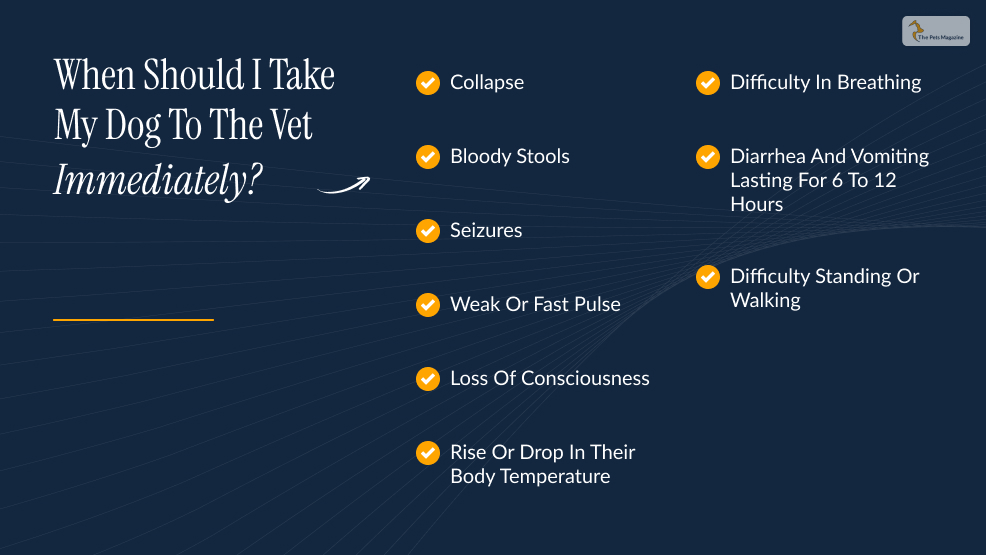
The main difference between humans and dogs is that humans are able to communicate when they are in pain and suffering. But this is exactly what dogs are unable to do. As a result, sometimes it is not possible to know that something is wrong with our dogs internally until something serious happens.
In such cases, you need to take your dog to the vet immediately. We have listed some of these situations below:
- Collapse
- Bloody stools
- Seizures
- Weak or fast pulse
- Loss of consciousness
- Rise or drop in their body temperature
- Difficulty in breathing
- Diarrhea and vomiting lasting for 6 to 12 hours
- Difficulty standing or walking
A few of these emergencies can easily be treated at home, but if you are not sure of yourself, then taking your dog to the vet is the best option. If you have pet insurance, then you are able to get certain benefits like a 24/7 emergency service to come to your house.
What Does Pet Insurance Cover?
When you are applying for pet insurance, then you should know that there are three main plans.
1. Accident-Only Plans
When it comes to accident-only plans, the coverages are medical expenses for your dog if they are bitten by a wild animal or even ingests window cleaner. But in this plan, they are not going to cover illnesses like urinary tract infections and thyroid diseases.
2. Accident And Illness Plans
For most pet parents in the U.S., the insurance plan they choose is this one. This is the plan that covers everything from critical surgeries to ingesting maybe a toy, or in need of an insulin injection for diabetes.
Under this plan, your dog’s pre-existing conditions are not covered, and neither grooming, test exam fees, or any other preventative care services like dental cleaning are covered.
3. Wellness And Routine Care Plans
This is like a discount plan that is issued by companies that offer certain add-on illness or accident plans.
How Much Does Pet Insurance Cost?
When it comes to pet insurance, there are a few costs that you need to consider. The cost of pet insurance usually ranges from somewhere around $20 to $44 each month. Even then, there are a few factors that you still need to consider when dealing with pet insurance.
- Insurance Company
- Annual Maximum
- Location
- Deductible
- Type Of Coverage
- Reimbursement
- Pet Age
- Breed
Tips and Tricks to Make the Most of Veterinary Appointments
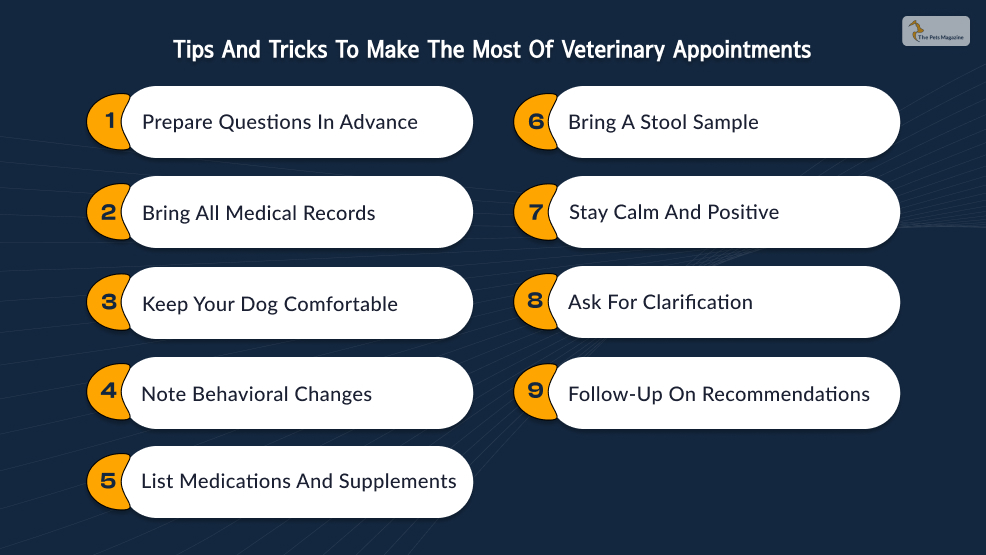
Even if you have pet insurance, those trips to the vet can quickly add up and burn a hole in your pocket. So, you need to make the most of each veterinary appointment. Here are some tips and tricks on how you can do it:
Prepare Questions in Advance
Write down any concerns or questions you have about your dog’s health, behavior, or diet. This ensures you don’t forget anything important during the visit.
Bring All Medical Records
If it’s your first visit to a new vet or if there have been any recent changes in your dog’s health, bring along their medical records. This helps the vet get a complete picture of your dog’s health history.
Keep Your Dog Comfortable
Bring your dog’s favorite toy or blanket to help them feel more at ease in the clinic.
Note Behavioral Changes
Keep track of any changes in your dog’s behavior, eating habits, or activity levels. These details can provide valuable insights for the vet.
List Medications and Supplements
Make a list of all the medications, supplements, and flea/tick preventatives your dog is currently taking. This helps the vet avoid any potential interactions.
Bring a Stool Sample
Many vets request a stool sample to check for parasites. Bringing one with you can save time and ensure a thorough check-up.
Stay Calm and Positive
Dogs can pick up on your emotions. Staying calm and positive can help reduce your dog’s anxiety during the visit.
Ask for Clarification
If you don’t understand something the vet says, don’t hesitate to ask for clarification. It’s important to fully understand your dog’s health and any recommended treatments.
Follow-Up on Recommendations
After the appointment, make sure to follow through on any recommendations or treatments prescribed by the vet. Schedule follow-up visits if necessary.
Now that you know the answer to ‘How often should I take my dog to the vet?’ mark those dates on your calendar so that you don’t forget them. Just remember your veterinarian should be your go-to for any personalized advice regarding your dog’s health.
Read Also:






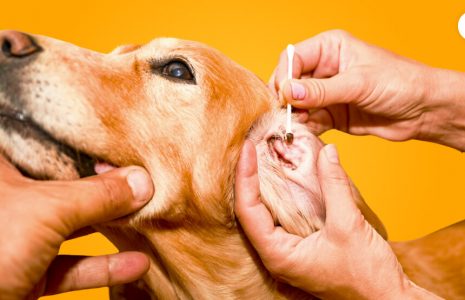


Leave A Comment